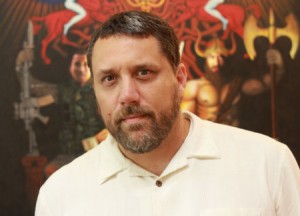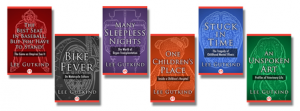Earl Swift: Auto Biography
January 18, 2015 by David
Filed under Non-Fiction, WritersCast
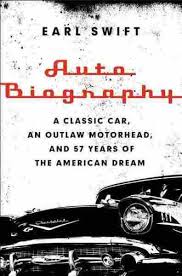 Auto Biography: A Classic Car, an Outlaw Motorhead, and 57 Years of the American Dream – 978-0062282668 – It Books (HarperCollins) – Hardcover – $26.99 – ebook versions available at lower price, paperback to be published March 17, 2015.
Auto Biography: A Classic Car, an Outlaw Motorhead, and 57 Years of the American Dream – 978-0062282668 – It Books (HarperCollins) – Hardcover – $26.99 – ebook versions available at lower price, paperback to be published March 17, 2015.
What a wonderful read this book is! The first thing you need to know is that I love old cars. I love stories about the people who love them, and rebuild them. But I also know that most old car stories are of limited interest to most people who don’t love old cars. Still – and yet – Auto Biography is much more than an old car story. Earl Swift is a terrific writer – trained as a journalist, which shows in his writing. He is clear and to the point. He never buries the lede. He gets close to the characters he writes about and portrays them brilliantly. And it’s impossible to put this book down once you get into the story, which just keeps going and going to a startling and rewarding end.
So yes, the book is about a car – a 1957 Chevrolet (one of the most iconic cars of our time) that Swift was able to trace from its first owner to its last. But it’s really about all the people who ever owned the car, and most crucially, it’s about Tommy Arney, the owner of the car when Swift begins his story. And Arney is a dream character for any writer, larger than life, complex and compelling. He is impossible to resist and Swift goes all the way in bringing us up close and personal with this incredible all-American character.
It was an incredible joy to read this book. As it happened, I was simultaneously reading a history of the automobile industry and for me, this book was by far the better book. It tells the story of what cars mean to our lives, how the cars we drive can capture our hearts and become our souls. I really enjoyed talking to Earl about this book and the story of how he came to write it is well worth listening to.
If you are interested in the way Americans live today, this book is one you must read. And if you just like a good story and you liked the way Hunter S. Thompson told them, this book ought to be perfect for you. Author website here, worth a visit.
“The story he tells of the car’s owners and, in particular, anti-hero protagonist Tommy Arney, is so detailed and informed by such thorough reportage I had to use Google to make sure Swift wasn’t embellishing — and I mean that as a compliment . . . . It’s the best contemporary book I’ve read about automobiles since A.J. Baime’s Go Like Hell, and I enjoyed the hell out of that.”
Matt Hardigree, Jalopnik.com
Longtime journalist Earl Swift wrote for newspapers in St. Louis, Anchorage, and for 22 years in Norfolk, where his long-form stories for The Virginian-Pilot were nominated five times for a Pulitzer Prize. Since 2012, he’s been a fellow of the Virginia Foundation for the Humanities at the University of Virginia.
He’s also the author of four other books of narrative nonfiction–THE BIG ROADS, a lively 2011 history of the interstate highway system and its effects on the nation it binds; WHERE THEY LAY: Searching for America’s Lost Soldiers, for which he accompanied an army archaeological team into the jungles of Laos in search of a helicopter crew shot down thirty years before (2003); JOURNEY ON THE JAMES, the story of a great American river and the largely untold history that has unfolded around it (2001); and a 2007 collection of his stories, THE TANGIERMAN’S LAMENT.

Podcast: Play in new window | Download
Jowita Bydlowska: Drunk Mom: A Memoir
November 16, 2014 by David
Filed under Non-Fiction, WritersCast
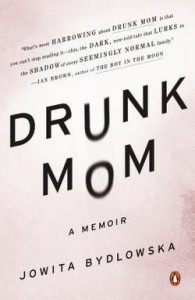 Drunk Mom – 978-0143126508 – Penguin – paperback – $16 (ebook editions available at lower prices)
Drunk Mom – 978-0143126508 – Penguin – paperback – $16 (ebook editions available at lower prices)
What an incredible book. Tough, loving, uncompromising. So much power in this book, admittedly at times, very painful to read, and stunningly honest to the point of extremism. But Jowita is such a fine writer, it is impossible not to admire this book and despite all the terrible things she tells us about herself, that she is alive, and able to speak her truth is incredible.
You know that any book with a title like this is going to be amazing, but there is no way to get through this book without being thoroughly bowled over, and depending on one’s tolerance for witnessing someone else’s painful mistakes, perhaps more than in any other book you will ever read. And yes, Jowita is completely and terrifyingly honest about herself and her misadventures throughout.
It’s valuable to understand that when Jowita first wrote this story, she wrote it pretending it was a novel. She had to get through that ironically deep denial as part of her ability to understand herself, one assumes. And that is part of the power of this book, that the author is able to uncover layers of denial, fear and guilt to get to a place where she can be honest with herself, and by telling that story to the world, reach a kind of absolution, a place in herself where she can be able to reconstruct herself, not forgiving, but finding the parts of her persona that are who she is not drinking. This is very powerful reading and a book I recommend no matter what you feel about yourself or others who are drinkers, addicted, lost, or found.
Short summary: Three years after she gave up drinking, Jowita Bydlowska found herself drinking again – at the party celebrating the birth of her son. Thus begins the harrowing tale of her descent, once again, into full blown alcohol and substance abuse. You have to read this one for yourself. Go buy this book, prepare yourself for a powerful experience, and read it now. Another good interview with the author on NPR here. And Jowita’s website, worth a visit – “I was born in Warsaw, Poland. I moved to Canada as a teenager. I live in Toronto with my little family in a little house. I write, write, write (compulsively, happily, unhappily, obsessively)” here.
I very much enjoyed talking to Jowita, who does a great interview. This conversation runs a bit long at 36 minutes, but hopefully it’s an experience well worth your time to hear.

Podcast: Play in new window | Download
Ladette Randolph: Leaving the Pink House – A Memoir
November 9, 2014 by David
Filed under Non-Fiction, WritersCast
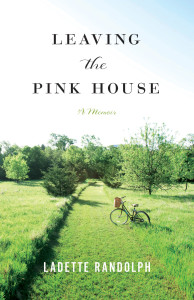 Leaving the Pink House: A Memoir – 978-1609382742 – University of Iowa Press – paperback – $18.00 (ebook editions available).
Leaving the Pink House: A Memoir – 978-1609382742 – University of Iowa Press – paperback – $18.00 (ebook editions available).
Ladette Randolph is both an editor and a writer; she is currently the editor of the fine literary magazine Ploughshares, whose founder, DeWitt Henry, I interviewed about that magazine’s history, and she’s written a total of four books and edited three more. She was previously an acquiring editor at University of Nebraska Press and earlier, the managing editor of Prairie Schooner. She has received four Nebraska Book Awards, a Rona Jaffe grant, a Pushcart Prize, a Virginia Faulkner award, and has been reprinted in Best New American Voices.
Ladette grew up and lived much of her life in Nebraska. In this really well written and beautifully composed memoir, Leaving the Pink House, she tells the story of her life through the houses she has lived in. At first, the book appears to be a relatively straightforward memoir of buying a dilapidated farmhouse to fulfill a dream of country living (the day after September 11, 2001), and the complication of leaving the pink house she and her husband had already turned into the house of their dreams.
But Randolph is writing to understand herself and where she comes from. Leaving one beloved house for another that is full of potential (for good and bad) spurs her into exploring her past life through the houses in which she lived. And she essentially tells herself – and her readers – where she came from, and how she became the person who is able to love and inhabit her own being in the present by exploring her life through the houses in which she lived from her early youth onward.
Randolph grew up in small towns in Nebraska; her father took his family with him as he worked to become an evangelical minister. Randolph tells us what it was like for her to experience the world through the lens of fundamentalism as she grew up and then into her early adult years. She experiences a series of awakenings, tragedies and struggles, all told without over dramatization and alternating with the mundane and always challenging work of remodeling the old house in the country and preparing to move from the pink house.
It’s an engaging and perceptive form of storytelling and much like a remodeling job itself, we learn with her as she goes through the work of tearing down and rebuilding the structure of her life. I greatly enjoyed reading this book, vicariously experiencing her challenges and accomplishments, and learning about her life experiences. Then having the opportunity to talk with Ladette about it only amplified my interest in her writing. Her active and informative website is here (and worth a visit).
Podcast: Play in new window | Download
Loren Glass: Counterculture Colophon
August 5, 2014 by David
Filed under Non-Fiction, WritersCast
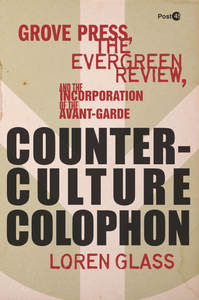 Counterculture Colophon: Grove Press, the Evergreen Review, and the Incorporation of the Avant-Garde (Post*45) – 978-0804784160 – Stanford University Press – Hardcover – $27.95 (ebook versions available at substantially lower prices)
Counterculture Colophon: Grove Press, the Evergreen Review, and the Incorporation of the Avant-Garde (Post*45) – 978-0804784160 – Stanford University Press – Hardcover – $27.95 (ebook versions available at substantially lower prices)
This book has turned out to be one of the most influential on my recent thinking about publishing and how it should work, proving that history can tell us a great deal about both the present and the future. Grove Press was immensely influential in changing American culture from the 1950s through the 1980s, and remains meaningful today, with its massive backlist representing the golden age of the literary avant-garde of that time. Its longtime owner and spiritual leader, Barney Rosset, has been an almost mythic hero to many who got into publishing because of what he accomplished with Evergreen Magazine and Grove Press. How a publisher could become so powerfully influential makes for a terrific and inspiring story.
Grove’s accomplishments and innovations are legion and well documented by Loren Glass in this book. While Counterculture Colophon is written as an academic history, and sometimes Glass falls prey to academic terminology that may put off the non-scholarly readers, I was happy to overlook the academic jargon and focus on the compelling story he tells of Grove and what it has meant for modern publishing.
This heroic and sometimes tragic saga reminds us of what it means to be a passionate and committed publisher. It’s difficult for anyone alive today to believe that up until the 1960s it was illegal to publish and sell literary books that included sexually explicit content. Battles were fought – and finally won at great expense – by Grove Press against the US government and many local jurisdictions over DH Lawrence’s Lady Chatterley’s Lover, Henry Miller’s Tropic of Cancer and William Burroughs’ notorious Naked Lunch. These cases literally led to “the end of obscenity” and created the groundwork that has enabled modern literary publishing to flourish in our time.
Rosset and Grove, together with myriad editors and publishers in Paris, London, San Francisco, and New York, were at the heart of a revolution in publishing, both in content and in form that in many ways inspired and led directly to an equivalent revolution in the overall American culture, that reverberates today. Grove was at the heart of political, cultural and literary ferment in North America, introducing new voices not only from here, but from around the world, to American readers. Rosset more or less invented the trade paperback, and was a leader in introducing trade books to be used as supplemental reading for college courses, of course hitting its stride at the very moment that the Baby Boom generation went to college. The magazine and press brought an emerging set of writers to an emerging generation of readers, inspiring and changing the way millions read and thought about writing, politics, theater and art. Grove Press was as much a cultural institution as it was a publisher.
And, importantly, what this book most strongly highlighted for me is the meaning and power of a publisher’s brand. It is widely accepted that most publishers today have no identity with readers. Grove Press and its house literary journal, the Evergreen Review, were made into powerful and coherent brands that recognized the publisher as enabled it to introduce formerly unknown writers and artists to their audiences. Using graphics, typography and a consistently subversive publishing program, Grove was able to become a recognized brand for readers, the power of which, seemingly very few publishers have understood or been able to duplicate.
Counter Culture Colophon is a book I strongly recommend to anyone interested in contemporary literature and of course, publishing. Loren Glass was able to interview Rosset and many other principle players in the story of the press. And for many, it will be a truly inspiring tale.
Loren Glass is a Professor of English at the University of Iowa. There is a really nice video of Glass speaking about Rosset and Grove at the Chicago Humanities Festival here. (55 minutes)
Podcast: Play in new window | Download
Sean Davis: The Wax Bullet War – Chronicles of a Soldier & Artist
June 21, 2014 by David
Filed under Non-Fiction, WritersCast
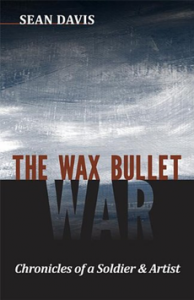 The Wax Bullet War: Chronicles of a Soldier & Artist – 978-1932010701 – paperback – Ooligan Press – $16.95 (ebook version available at lower prices)
The Wax Bullet War: Chronicles of a Soldier & Artist – 978-1932010701 – paperback – Ooligan Press – $16.95 (ebook version available at lower prices)
Sean Davis grew up in Oregon, joined the Army after high school, went to art school for awhile, had an unsuccessful relationship with an attractive woman, and was working at an unsatisfactory job as a highway worker on September 11, 2001. The next day he walked into the Oregon National Guard recruiting office and re-enlisted, on the working assumption that he would be contributing to the greater good and giving himself a sense of direction and meaning. He had no idea he would soon end up on active duty in Iraq on the front lines of the war trying to figure out how to be a sensitive warrior in a strange country.
Davis is a talented writer and exceptional memoirist with a keen eye for details and a wry sense of humor. In Iraq he lost his best friend in an ambush and was himself critically wounded. He returns home after a lengthy period of recovery to deal with the aftermath of his experiences and suffers through what we now know is so common for the veterans of our seemingly endless recent wars, alcohol and drug dependency and a minimally helpful support system. Somehow, Davis managed to rediscover the interior place where his art comes from and was able to rebuild his life. He now has a family, an advanced degree, is actively an artist and a writer, and has created a nonprofit organization (A Rock or Something Productions: “veterans getting veterans into the arts”) to connect other veterans to the healing power of the arts.
Davis recounts the seeming insanity of daily life in the war zone with humor and clarity, and clearly cares deeply about the civilians he encountered in Iraq as well as the men and women with whom he served. As an example, the wax bullets in the title were what was used in training exercises in Kuwait prior to active deployment – to save money. Evidently it escaped the thinking of military planners that in the plus 100 degree temperature there, the bullets would melt, fouling the soldiers’ guns, wasting time and endangering their lives. This is not the only example of how things go wrong for US soldiers and the Iraqi people in the midst of the war, which Davis describes with a soldier’s sense of black humor.
His description of what happened to him after he returned home is terrifying and powerful. When he does rediscover himself, we are right there with him, joined with his indomitable spirit to become someone better, someone who can be alive and present and fully engaged in the beingness of humanity.
The Wax Bullet War is a beautiful book, incredibly moving and compelling. I’d recommend adding it to the short list of great books about war and specifically about the real experiences of soldiers who fight and then must live their lives in time of peace. Put aside some quiet time to read it and let it sink in. Sean Davis website. Publisher Ooligan Press website.
Sean Davis bio: Sean Davis is an artist, writer, and returning veteran of the Iraq War. He earned a bachelor’s degree in English from Portland State University and an MFA in Writing from Pacific University. His previous work includes the novel Motivation and Toleration, published under the name Ian Avi, as well as contributions to the Portland Mercury, Nailed Magazine, and Split Infinitive. He has appeared on 60 Minutes and is one of the cofounders of Hubris Press in Portland, where he lives with his wife and daughters.
Podcast: Play in new window | Download
Lee Gutkind: True Crime
March 8, 2014 by David
Filed under Non-Fiction, WritersCast
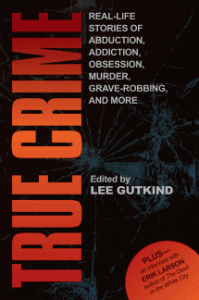 True Crime: Real-Life Stories of Abduction, Addiction, Obsession, Murder, Grave-Robbing and More – 978-1-937163-14-3 – paperback – InFACT Books – $15.95 (ebook versions available at lower prices)
True Crime: Real-Life Stories of Abduction, Addiction, Obsession, Murder, Grave-Robbing and More – 978-1-937163-14-3 – paperback – InFACT Books – $15.95 (ebook versions available at lower prices)
Lee Gutkind is a long time writer and teacher of writing. He is the author or editor of more than 25 books and is also the founder and editor of Creative Nonfiction, a literary magazine that publishes narrative nonfiction exclusively. In many ways, he is a central figure in the growing category of creative nonfiction, a category of writing that has become significant only in the past thirty years.
True Crime is a collection, mostly but not all first person narratives of some very scary stuff. I think true crime writing can be much more disturbing than even the scariest fiction stories, mainly because we know these stories are true, and that the suffering we are reading about was experienced by real people. At the same time, what makes these experiences meaningful to us is the writers’ ability to transform direct experience into compelling narrative. They’ve still got to tell a great story or else the experiences they write about, regardless of their factual existence, will not have truly deep or meaningful impact on readers.
While this sometimes painful to read book is not what I usually am drawn to read, since my goal with Writerscast has always been to broaden my reading, with Lee Gutkind’s True Crime, I have certainly succeeded in going beyond my regular literary consumption. This is a powerful collection of narratives, almost all of which really do achieve the status of literary works, by virtue of their success in the transformation of direct experience into story telling. There is some excellent writing here, and stories well worth reading.
If I had to pick a favorite, it would be Girl Fighting, by Laurie Lynn Drummond, a former Louisiana police officer who is now (a very good) writer. Perhaps the most powerful and emotionally wrenching piece for me is Gabrielle Giffords Shooting: A Fatal Chain of Events Unfolds, a retelling that made me cry; perhaps the most painful and thought provoking is Spectacle: The Lynching of Claude Neal, but there are many others that moved me, and there were no stories I did not find interesting to read.
I can recommend this book to anyone interested in contemporary American writing.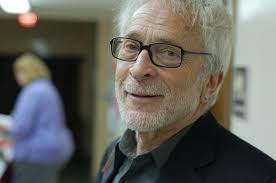 Don’t mistake this book for journalism, recounting of violent crimes to entertain. This book is about the nature of violence and the varieties of human behavior we experience but sometimes do not understand.
Don’t mistake this book for journalism, recounting of violent crimes to entertain. This book is about the nature of violence and the varieties of human behavior we experience but sometimes do not understand.
Received a few days after I posted this interview: Open Road Media is pleased to announce the ebook publication of six classic works by Lee Gutkind, hailed by Vanity Fair as “the godfather behind creative nonfiction,” available on March 11, 2014.
Podcast: Play in new window | Download
Publishing Talks: David Wilk interviews DeWitt Henry of Ploughshares
February 10, 2014 by David
Filed under Publishing History, PublishingTalks
 Publishing Talks began as a series of conversations with book industry professionals and other smart people about the future of publishing, books, and culture. As we continue to experience disruption and change in all media businesses, I’ve been talking with some of the people involved in our industry about how they believe publishing might evolve as our culture is affected by technology, climate change, population density, and the ebb and flow of civilization and economics.
Publishing Talks began as a series of conversations with book industry professionals and other smart people about the future of publishing, books, and culture. As we continue to experience disruption and change in all media businesses, I’ve been talking with some of the people involved in our industry about how they believe publishing might evolve as our culture is affected by technology, climate change, population density, and the ebb and flow of civilization and economics.
Recently, the series has been expanding to include conversations about a wider range of subjects beyond my initial interest in the future of publishing. I’ve talked with editors and publishers who have been innovators and leaders in independent publishing in the past and into the present, and will continue to explore the past, present and future of writing, books, and publishing in all sorts of forms and formats, as change continues to be the one constant we can count on.
It’s my hope that these conversations can help us understand the outlines of what is happening in publishing and writing, and how we might ourselves interact with and influence the future of publishing as it unfolds. This week’s interview reflects my interest in comic art, illustrated story telling and new technology as a platform for expanding story telling in interesting and challenging ways.
Ploughshares is one of the great literary magazines of the last fifty years. Founded in 1971 in Boston by writer, teacher and scholar DeWitt Henry and writer and bar owner Peter O’Malley, it has gone on brilliantly from very humble beginnings to publish an extraordinary range of writing. Founded in a bar called the Plough and the Stars in Cambridge, Massachusetts, Ploughshares to give the young and upcoming writers of its time a voice and a platform, the magazine has been a literal breeding ground for great writers of fiction, poetry and nonfiction as well.
One of its innovations was to invite writers to guest edit individual issues. The list of editors is pretty incredible, including Seamus Heaney, Derek Walcott, Rita Dove, James Alan McPherson, Philip Levine, Gerald Stern, Raymond Carver, Rosellen Brown, Maxine Kumin, Donald Hall, Marilyn Hacker, Mark Doty, Richard Ford, Sherman Alexie, and many others. Ploughshares editors have received almost every award given in American writing. Throughout its now celebrated history, Ploughshares has managed to maintain a high level of excellence in writing and has avoided being trapped by the narrowness of a particular school or narrow vision of what American writing can be. It has consistently nurtured new talent, and continues today to bring attention to new writers. And lately, Ploughshares has broadened the definition of what a literary magazine can be with an innovative series of ebooks called Ploughshares Solos.
Interviewing DeWitt Henry about the history of the magazine, bis work as editor and writer, and the current and future of Ploughshares was a great pleasure for me. Having been involved in literary publishing and distribution myself, I know how incredibly difficult it is to sustain both the artistic and structural vision in this kind of publishing. Ploughshares truly represents an extraordinary accomplishment for those who have worked on it, published in it, and of course read the magazine during the many years of its existence.
There’s an excellent history of the magazine on it website. And you might want to visit DeWitt Henry’s own website to learn more about him as well. He is am accomplished and interesting writer too. Alert to listeners, as this is part of an effort to document the oral history of literary publishing, this is a longer than usual podcast – but worth your time to listen.
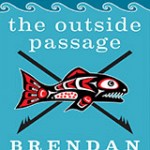
Podcast: Play in new window | Download
Daniel Pink: To Sell is Human
January 26, 2014 by David
Filed under Non-Fiction, WritersCast
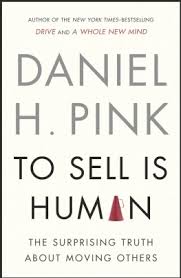 To Sell Is Human: The Surprising Truth About Moving Others – 978-1594631900 – Riverhead Books – paperback – $16 – ebook versions available at lower prices.
To Sell Is Human: The Surprising Truth About Moving Others – 978-1594631900 – Riverhead Books – paperback – $16 – ebook versions available at lower prices.
Daniel Pink is a terrific writer and in addition, he is extremely cogent in his thinking and presentation of ideas. The result is that his writing is very persuasive. I have long thought that selling is something that most of us do in one form or another on many occasions. Selling in that day to day sense, is about persuasion. Some of us are better at it than others, but it’s part of the fabric of human relationships. So I was very excited to discover this book and having read it, am now a big fan of Daniel Pink’s thinking on this subject.
Pink spent a lot of time and energy studying how the new American labor force works. In To Sell is Human he shows clearly that in today’s connected world, with selling defined as *moving* or *persuading* others – customers or colleagues, those you work for and those who work for you – all of us are ultimately involved in a form of selling.
As Pink himself puts it: “Whether we’re employees pitching colleagues on a new idea, entrepreneurs enticing funders to invest, or parents and teachers cajoling children to study, we spend our days trying to move others.”
Pink brings this home by drawing on social science but his insights are what makes this book special. The old rules of selling don’t apply anymore, and he tells us what we need to do in order to be successful in the modern world of collaboration and constant change.
Pink presents six successors to the elevator pitch, three rules for understanding others, five frames that can help us be more persuasive then ever, and more. This books is both visionary and practical, and really may change the way you think and therefore how you act in both work and personal social situations.
Dan Pink is a prolific author and motivational speaker. Dan’s first book, Free Agent Nation: The Future of Working for Yourself, was a Washington Post bestseller. He also wrote The Adventures of Johnny Bunko: The Last Career Guide You’ll Ever Need (the first American business book done in manga form). A Whole New Mind: Why Right-Brainers Will Rule the Future and another excellent book, Drive: The Surprising Truth About What Motivates Us. In total, this is a very impressive body of work. And as you can readily imagine, he is a great conversationalist and therefore we had a terrifically interesting conversation. A visit to his website is highly recommended.
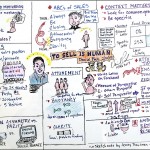
Podcast: Play in new window | Download
Paul Conroy: Under the Wire: Marie Colvin’s Final Assignment
November 3, 2013 by David
Filed under Non-Fiction, WritersCast
 978-1602862364 – Weinstein Books – hardcover – October 8, 2013 – $26.00 (ebook versions available, prices vary depending on retailer)
978-1602862364 – Weinstein Books – hardcover – October 8, 2013 – $26.00 (ebook versions available, prices vary depending on retailer)
Marie Colvin was an award-winning journalist who wrote principally for the London Sunday Times for almost thirty years until she was killed covering the siege of Homs in Syria in February, 2012. She was raised in Oyster Bay (Long Island), NY, graduated from Yale in 1978 who worked for the British newspaper The Sunday Times from 1985 until her death.
Marie was an activist journalist in the best sense of the word, committed to reporting the lives and conditions of the oppressed and especially civilians suffering in wars, armed conflicts and governmental actions. Her writing was vivid and clear, gripping and very muscular.
Colvin specialized in the Middle East, but also worked in East Timor, Sri Lanka, Chechniya and the Balkans. She was recognized by the British Press awards for her reporting in Chechniya (and an amazing escape from that war zone, also grippingly reported). In East Timor in 1999, she helped save the lives of 1,500 refugees stranded in a United Nations compound that was surrounded by the Indonesian Army after the Timorese chose independence from Indonesia in a referendum. Colvin and two other journalists refused to leave and forced the UN to stay as well, and eventually the refugees were extracted and taken in by Australia.
In 2001 she became the first Western journalist in years to enter Tamil Tiger rebel territory in northern Sri Lanka. When she returned to the government-controlled area, her group was fired on by Sri Lankan military, and she was wounded by shrapnel, losing the use of an eye. She famously wrote a 3,500 word dispatch about her adventure while in the hospital in NY for surgery. From that time onward, her black pirate-style eye-patch became the emblem that represented her irrepressible spirit to all.
John Burns, the veteran New York Times foreign correspondent, called her “one of the most respected and celebrated reporters on Fleet Street…She was, of course, absolutely fearless, though she knew the dangers well.”
Alan Philps, a former Telegraph foreign correspondent said: “What she brought to journalism was being a great eyewitness and being incredibly brave. It was a role she settled into and she never saw another form of journalism she wanted to do, but that meant she sacrificed everything for the job.”
In 2010 at a London newspaper industry service for fallen British journalists, she gave a moving speech about the work and risks of foreign correspondents: “We always have to ask ourselves whether the level of risk is worth the story. What is bravery, and what is bravado?
“Journalists covering combat shoulder great responsibilities and face difficult choices. Sometimes they pay the ultimate price.”
Marie Colvin reported from Libya in the middle of many battle zones during the revolution against Qadaffi, where she worked with photographer Paul Conroy, who became a close friend of Colvin’s. In 2012, the two of them, working for the Sunday Times, made their way into Homs in Syria, where the government was bombarding the local population into submission.
Under the Wire is Conroy’s story about his friendship and work with Marie Colvin in Libya and Syria. Most of the book is a blow by blow account of their time in Homs, where Marie was killed while trying to leave Homs after many days in terrible danger, along with French photographer Remi Ochlik and Conroy was grievously wounded as well.
The book is a vivid and powerful account, not only of the work of the foreign correspondents who went to Syria to document what was going on there, but of the people in the country on the rebel side, who wanted Marie, Paul and other western journalists there to report what was happening. Acts of bravery, selflessness and heroism abound.
Paul Conroy’s story is a gripping and painful celebration of the human spirit, full of bravery and hope and a wonderful memorial to the work and life of Marie Colvin. It’s also a reminder, as the civil war in Syria continues, of how much we need people like Marie to serve as a public conscience in the face of oppression and state sponsored violence.
Marie Colvin’s work has been published as On the Front Line: The Collected Journalism of Marie Colvin. Visit her website to learn more about her life and work, and the Marie Colvin Memorial Fund. The Colvin family has established a memorial fund in honor of Marie. The fund will direct donations to charitable and educational organizations that reflect Marie’s lifelong dedication to humanitarian aid, human rights, journalism and education. 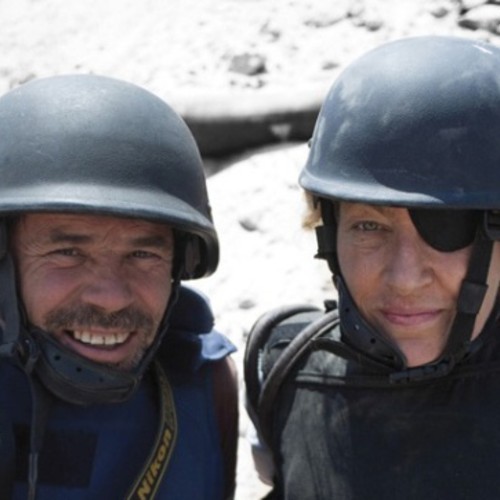
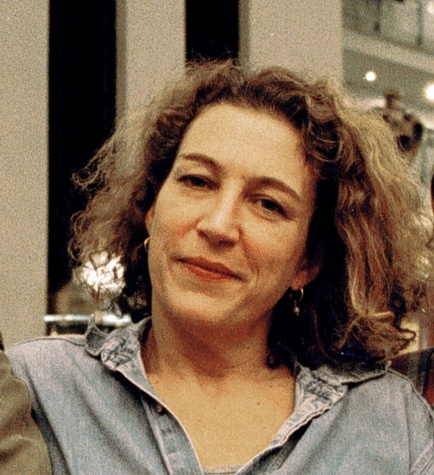
Podcast: Play in new window | Download
Douglas Rushkoff: Present Shock: When Everything Happens Now
September 21, 2013 by David
Filed under Non-Fiction, WritersCast
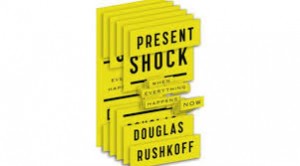 978-1591844761 – Current – Hardcover – $26.95 (ebook versions available at lower prices, and paperback edition due February 2014)
978-1591844761 – Current – Hardcover – $26.95 (ebook versions available at lower prices, and paperback edition due February 2014)
“If the end of the twentieth century can be characterized by futurism, the twenty-first can be defined by presentism.”
As it happens, I started this Writerscast project as an antidote to my own sense of what Douglas Rushkoff calls Present Shock, which is about how time, technology, attention, human intelligence, culture, meaning, advertising, commerce and belief systems that mark 21st century modern life have changed the way we experience our lives. This is an important book that having read and thought about, I can highly recommend.
What is ironic is that all of the things about our time that Rushkoff talks about in Present Shock, our feeling of being too busy and overwhelmed with input, our inability to filter out what does not matter to us and to focus on what does matter most are all the reasons why so many people I know will end up not reading this book at all. In fact the author felt those same issues during the writing of the book, and had to devise a plan and method that allowed him to concentrate on getting the work done.
You are not alone if you are feeling the need to make some space for yourself. It took me much longer to read this book than it would have some years ago. And it took me much longer to find the space in my life to write this short piece and post it than I am comfortable with. Technology in communication has enabled tremendous gains for many of us, while at the same time enslaving us to our devices.
Rushkoff brilliantly describes what has happened to us – the end of narrative, changes in the way we perceive and operate in time, what he calls digiphrenia – mental chaos provoked by digital experience – our need to escape the present, and our inability to filter information and sensory input. We instinctively know what he is talking about because we experience it ourselves every day.
But most of the time, most of us believe all of these concerns are personal and individual – how do I learn how to cope with the modern world? I think Rushkoff’s point in this book is that these are not individual problems, they are structural, and we need to start thinking about ways we can alter the course of our culture, to take control of technology, to act rather than be acted upon. In that way, this is an inspiring book, which I hope will lead to change in thinking and behavior.
I interviewed Doug about one of his earlier books, Program or Be Programmed. He is a terrific talker as well as writer and I am sure you will enjoy listening to our conversation. 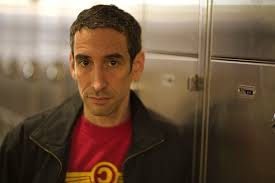
Podcast: Play in new window | Download


